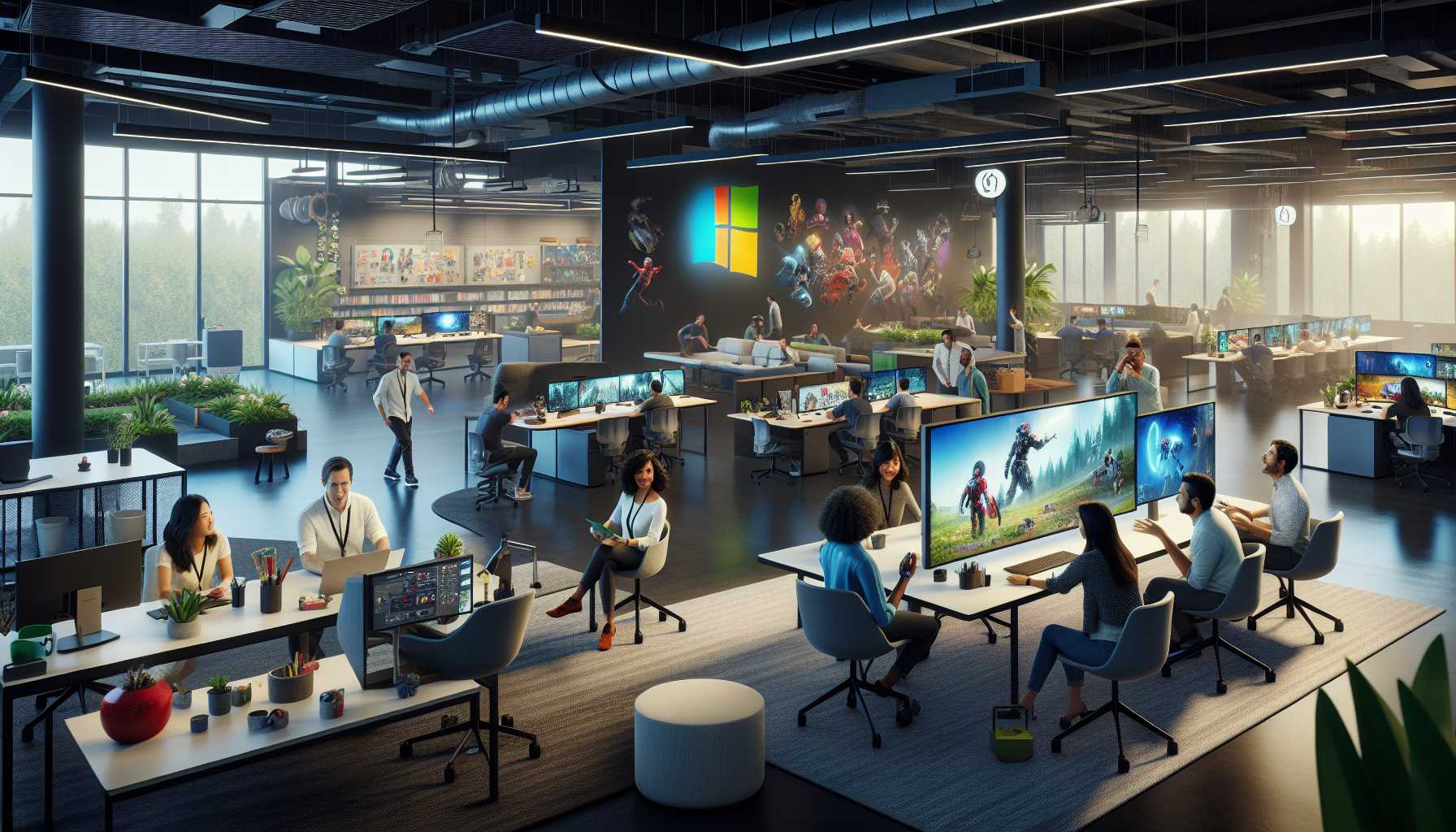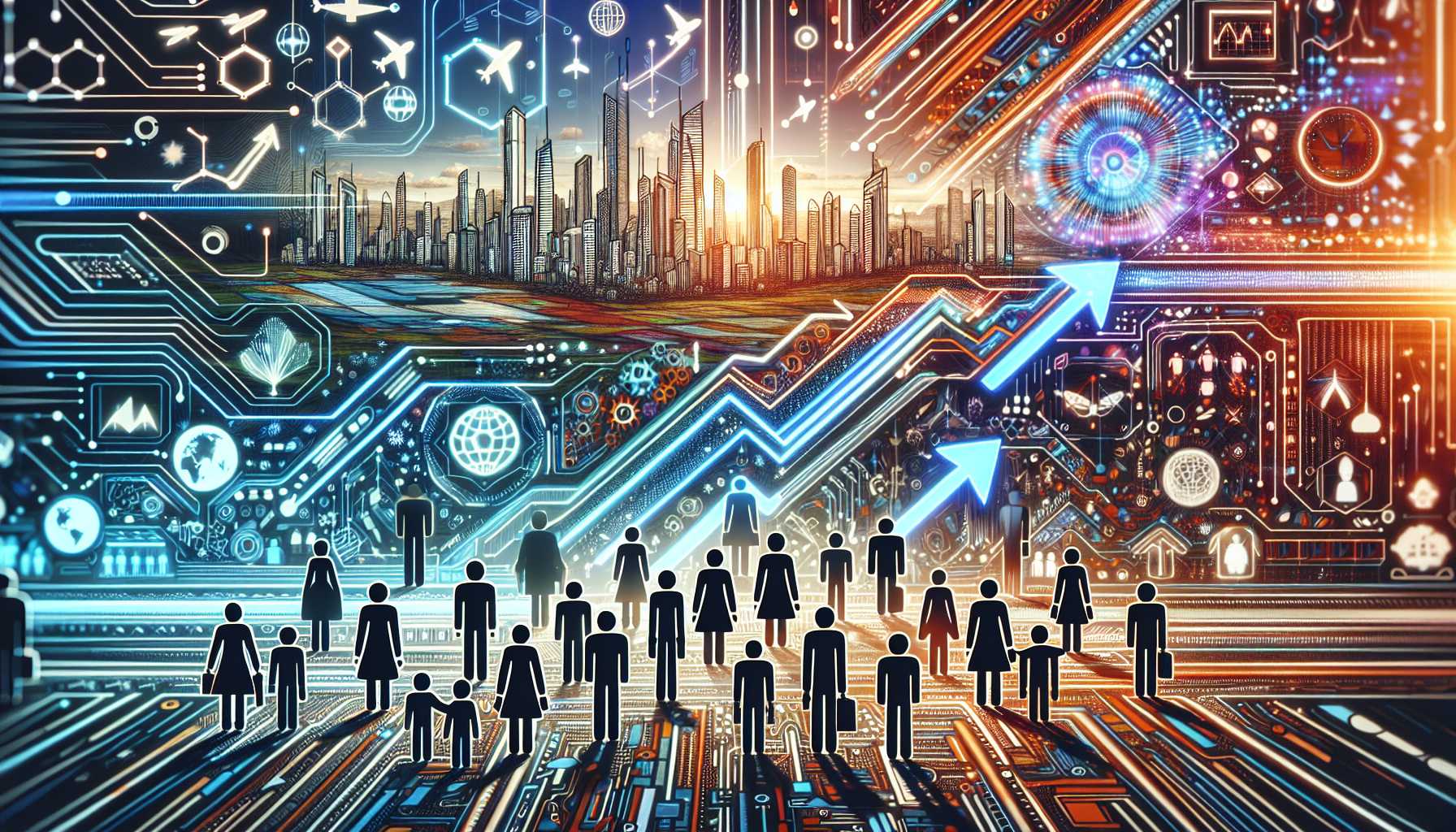The tech industry is often hailed as a vanguard of innovation, yet it seems that even the most avant-garde fields are not immune to age-old challenges. Today, we’re delving into two distinct narratives that, together, paint a broader picture of the tech industry’s current state: the ongoing scrutiny of diversity practices at the frontier of AI development, specifically within the domains of OpenAI, contrasted against the seismic shifts in employment at behemoths like Microsoft, particularly within their gaming divisions. Join me as we navigate through the tides of change and debate that are both driving and challenging the tech world.
The Diversity Directive at the Forefront of AI: OpenAI Under the Microscope
 The call for diversification within the tech industry is not just about optics; it’s about operational effectiveness and innovation. The Congressional Black Caucus’s recent correspondence with OpenAI illustrates the tightrope that companies must walk—balancing the swift advances in artificial intelligence with a board that reflects the multifaceted society it aims to serve. OpenAI, known for its creation of GPT (Generative Pre-trained Transformer) models and its overarching mission to ensure AI benefits all of humanity, is now in the spotlight for what is perceived as a lackluster effort in diversifying its board—currently an all-white male ensemble. Despite a prompt acknowledgment that building a diverse board is a top priority and the engagement of an executive search firm, the broader tech community is seeking more definitive action steps. As a product leader and tech enthusiast, I find this tension to be both disheartening and motivating. It is a powerful reminder that industry leadership benefits significantly from diverse perspectives that can challenge the status quo and navigate potential biases—particularly in AI. In complete candor, while company policies may ban hateful content and tools could help detect hate, these are merely features, not cultural cornerstones. Having a board rich in distinctive backgrounds isn’t just good for optics—it’s essential for the integrity and efficacy of AI applications. The rebuttal might be that talent acquisition takes time, especially at the executive level, yet the urgency underpinning this matter is tied to the very products OpenAI creates. If AI is to be unbiased and equitable, its creators and guardians must embody those qualities.
The call for diversification within the tech industry is not just about optics; it’s about operational effectiveness and innovation. The Congressional Black Caucus’s recent correspondence with OpenAI illustrates the tightrope that companies must walk—balancing the swift advances in artificial intelligence with a board that reflects the multifaceted society it aims to serve. OpenAI, known for its creation of GPT (Generative Pre-trained Transformer) models and its overarching mission to ensure AI benefits all of humanity, is now in the spotlight for what is perceived as a lackluster effort in diversifying its board—currently an all-white male ensemble. Despite a prompt acknowledgment that building a diverse board is a top priority and the engagement of an executive search firm, the broader tech community is seeking more definitive action steps. As a product leader and tech enthusiast, I find this tension to be both disheartening and motivating. It is a powerful reminder that industry leadership benefits significantly from diverse perspectives that can challenge the status quo and navigate potential biases—particularly in AI. In complete candor, while company policies may ban hateful content and tools could help detect hate, these are merely features, not cultural cornerstones. Having a board rich in distinctive backgrounds isn’t just good for optics—it’s essential for the integrity and efficacy of AI applications. The rebuttal might be that talent acquisition takes time, especially at the executive level, yet the urgency underpinning this matter is tied to the very products OpenAI creates. If AI is to be unbiased and equitable, its creators and guardians must embody those qualities.
Shifting Tides: The Layoff Wave Sweeping Through the Game of Titans
 On an equally important but contrasting note, the winds of economic change are gusting through the colorful corridors and past the cubicles of creativity within Microsoft’s gaming divisions. The news of 1,900 layoffs accounts for a significant 8% of its workforce in this realm, marking a stark turn in the saga of gaming’s giants. As a trifecta of sorrow for many, Microsoft’s cuts primarily impact Activision Blizzard right amidst their acquisition. It’s a move that Microsoft Gaming CEO Phil Spencer describes as necessary to align strategy with a sustainable cost framework. The concept of sustainability in the gaming industry is no child’s play; it’s an intricate dance of forecasting user engagement, market trends, and development costs. In a sector that prides itself on perpetual advancement and fantastical worlds, the harsh reality of economic downturns provides a sobering anchor. In a particularly humanizing gesture, outgoing Blizzard President Mike Ybarra’s farewell message to those affected is a testament to the personal toll such decisions take. The cancellation of a survival game under development at Blizzard, though a seemingly strategic move, hints at the cyclical nature of project initiation and termination in gaming—a sector where investments require as much foresight as faith. Amidst the layoffs lies a shining beacon of corporate confidence, however; Microsoft’s gaming strategy remains robust, aiming to bring more games to a broader audience. This gritty optimism, juxtaposed with the unfortunate news of staff reductions, frames the gaming industry as one of passion and persistence, even in the face of economic adversity.
On an equally important but contrasting note, the winds of economic change are gusting through the colorful corridors and past the cubicles of creativity within Microsoft’s gaming divisions. The news of 1,900 layoffs accounts for a significant 8% of its workforce in this realm, marking a stark turn in the saga of gaming’s giants. As a trifecta of sorrow for many, Microsoft’s cuts primarily impact Activision Blizzard right amidst their acquisition. It’s a move that Microsoft Gaming CEO Phil Spencer describes as necessary to align strategy with a sustainable cost framework. The concept of sustainability in the gaming industry is no child’s play; it’s an intricate dance of forecasting user engagement, market trends, and development costs. In a sector that prides itself on perpetual advancement and fantastical worlds, the harsh reality of economic downturns provides a sobering anchor. In a particularly humanizing gesture, outgoing Blizzard President Mike Ybarra’s farewell message to those affected is a testament to the personal toll such decisions take. The cancellation of a survival game under development at Blizzard, though a seemingly strategic move, hints at the cyclical nature of project initiation and termination in gaming—a sector where investments require as much foresight as faith. Amidst the layoffs lies a shining beacon of corporate confidence, however; Microsoft’s gaming strategy remains robust, aiming to bring more games to a broader audience. This gritty optimism, juxtaposed with the unfortunate news of staff reductions, frames the gaming industry as one of passion and persistence, even in the face of economic adversity.
Emerging Narratives and the Broader Tech Ecosystem
 What we’re witnessing with OpenAI and Microsoft isn’t taking place in isolation. It’s part of a grander narrative that’s engulfing the tech industry as a whole. Layoffs have become a regular headline across an array of companies and sectors within tech, signaling a collective inhale in preparation for potential economic slowdowns. Simultaneously, we’re dancing with the delicate yet potent topics of diversity and representation—critical discussions that demand more than transient commitments and press releases. These aren’t issues that will be solved overnight, but require an ongoing dialogue and real action. As a tech investor and expert, the eclectic mix of optimism and resilience amidst strategic cutbacks and calls for inclusion paints a picture of an industry in transformation. It’s a sector that’s continually rewriting the best practices for navigating a digital landscape that mirrors the dynamic and diverse world we live in. The lessons here are multifaceted. Yes, the tech sector must strive for diverse representations within its decision-making bodies to genuinely tap into AI’s potential without inadvertent biases. Concurrently, the industry must continue to redefine sustainability amidst fluctuations and revolutions. By acknowledging and addressing these needs, tech can pave a path toward a future that’s not only innovative but also inclusive and equitable.
What we’re witnessing with OpenAI and Microsoft isn’t taking place in isolation. It’s part of a grander narrative that’s engulfing the tech industry as a whole. Layoffs have become a regular headline across an array of companies and sectors within tech, signaling a collective inhale in preparation for potential economic slowdowns. Simultaneously, we’re dancing with the delicate yet potent topics of diversity and representation—critical discussions that demand more than transient commitments and press releases. These aren’t issues that will be solved overnight, but require an ongoing dialogue and real action. As a tech investor and expert, the eclectic mix of optimism and resilience amidst strategic cutbacks and calls for inclusion paints a picture of an industry in transformation. It’s a sector that’s continually rewriting the best practices for navigating a digital landscape that mirrors the dynamic and diverse world we live in. The lessons here are multifaceted. Yes, the tech sector must strive for diverse representations within its decision-making bodies to genuinely tap into AI’s potential without inadvertent biases. Concurrently, the industry must continue to redefine sustainability amidst fluctuations and revolutions. By acknowledging and addressing these needs, tech can pave a path toward a future that’s not only innovative but also inclusive and equitable.
Conclusion: Contemplating the Tech Industry’s Evolving Legacy
 The tech industry is undoubtedly facing some of its most challenging waves to date with the recent scrutiny on diverse representation and significant workforce reductions. However, it is in the confluence of these discussions and actions, ranging from board diversity to layoffs, that the true resilience and potential of the field will be tested and revealed. As we carve out silicon-engraved narratives drenched in hope and hard decisions, let’s not lose sight of the industry’s ultimate pursuit: to leverage the astounding power of technology to reflect and uplift the dynamism of human diversity and creativity. The conversations ignited by entities like the Congressional Black Caucus and the realities mirrored by Microsoft’s recent layoffs will undoubtedly be instrumental in shaping this journey. In the symphony of circuit boards and code, may the voices of many harmonize to create a tomorrow that is as boundless and inclusive as the virtual worlds we endeavor to construct.
The tech industry is undoubtedly facing some of its most challenging waves to date with the recent scrutiny on diverse representation and significant workforce reductions. However, it is in the confluence of these discussions and actions, ranging from board diversity to layoffs, that the true resilience and potential of the field will be tested and revealed. As we carve out silicon-engraved narratives drenched in hope and hard decisions, let’s not lose sight of the industry’s ultimate pursuit: to leverage the astounding power of technology to reflect and uplift the dynamism of human diversity and creativity. The conversations ignited by entities like the Congressional Black Caucus and the realities mirrored by Microsoft’s recent layoffs will undoubtedly be instrumental in shaping this journey. In the symphony of circuit boards and code, may the voices of many harmonize to create a tomorrow that is as boundless and inclusive as the virtual worlds we endeavor to construct.




